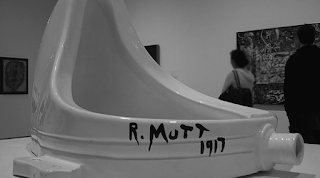 |
| The Fountain, Marcel Duchamp |
On the 9th of April, 1917, a urinal presented itself to the Society of Independent Artists. It was not warmly received - in fact, when the Society came to display all their artwork, they hid this piece behind a partition. And yet, almost a hundred years later, 500 artists would vote this boisterous urinal the most influential artwork of the twentieth century. Most people know this work, for better or for worse, as Marcel Duchamp’s Fountain.
Yes, I said the urinal ‘presented itself.’ It did. Marcel Duchamp may have carried it, or had someone carry it, but the urinal entered the Society of Independent Artists entirely of its own volition. It possessed Duchamp; much like the hairworm insect, that uses mind-control chemicals to direct crickets towards light, the urinal’s chemicals compelled Marcel, and through him the world, towards modernist artistic enlightenment.
So the urinal would have placed itself on a pedestal in a gallery whether Duchamp put it there or not. That is because of the following:
Art is self-aware. It is a living being, with its own mind. Descartes said “I think therefore I am”, but art has flipped his formula: it exists, therefore it must think. That’s because art is an expression of human consciousness that can surprise even the humans who think it into existence. A painting exists independently of its painter, like a son of his mother. Sure, there’s some shared genetic material, but both are altered by their contexts, their surroundings. Both say new things to new people. Both have different priorities. The fact that such an independent expression of consciousness can exist in new contexts that its artist never anticipated must mean that art can think for itself.
So what does Art think about?
Well, for a long time, Art focussed on us. It thought about human hands, and what we did with those hands: hunt, burn, dance. Much later, it thought about human bodies, Greek ones mostly, with sixpacks and no clothes.
In fact, Art’s never really given up its love of the nude and the naughty. It couldn’t seem to depict something as misérables as the French Revolution without indulging in the liberté of a double nip-slip. But I digress. The point is, Art has been, for a long time, obsessed with us humans.
But on the ninth of April, 1917 (among other occasions in the peak of the Modernist period), angry, adolescent Art said “enough about you. Now it’s time to talk about me.” It had done so before, flirting with Velasquez and others, but now it was ready to own the look.
And the look, much to the dismay of its critics at the time, was a urinal.
It could only have been a urinal, and it could only have been then. That specific urinal, turned ninety degrees, labelled Fountain and signed ‘R. MUTT, 1917’, was the answer to art’s biggest, most elusive question:
“What is art? I mean, seriously, what the fuck is it?”
A urinal on a pedestal in the Society of Independent Artists. That’s what.
“Yep. Here I am! Get a good look, I’m not taking the piss,” Art announces, smirking.
And we turn away, embarrassed at the realisation that our collective adolescent has grown up a bit weird, and that we’re probably quite responsible for that. So we decide we’re going to have to discipline Art, otherwise who knows where it’ll go next?
But we are missing the point: the acting-out, the disgusting appearance, the urinal, is Art telling us “I’ll be alright on my own. I just need you to stop trying to define me.”
That’s exactly why Fountain was an artwork created from inevitability: we were always going to ask “What is Art?”, and the only answer to the question “What is art?” is “None of your business.” That answer could only be delivered via an object that created distance between itself and us.
Think about the impact of the Fountain: never before has a device specifically intended to be pissed on managed to not only reject its own role, but to reject it in such a way as to render the majority of art-snob society pissed off. A feat of hydraulics, a piss-off piston put poetically in pride of place before the bored and the brooding intelligentsia, this fountain was able to water the already-ripening fruits of methodical modernist madness, with a sourness that still tingles the tongue today.
And talking of tongues, art is supposed to ‘speak to’ us. To communicate. But, as any male reader of this art(icle) will be all-too-aware, convention absolutely forbids any attempts at conversation in the vicinity of a urinal. Initiating a dialogue near (or, even worse, with) a urinal is a reliable way to get oneself either punched in the face or committed to an institution even more unsanitary than the men’s bathroom. I think it’s this force-field of hush unique to urinals that still makes most of us unready to see such an object as art.
Art has moved out; it grew up so fast.
But occasionally it pops round to see us. We still feel the backsplash from the Fountain in the music of modern artists. Arguably, Kanye West’s N***as in Paris participates in the same tradition of dark-twisted tonality that characterises modernist music; in any case, it provides us with the perfect articulation of what art is:
Kanye samples a Will Ferrell movie, an exchange between two characters who could just as easily be standing in front of the Fountain as any other work of art anywhere. It goes like this:
“I don’t even know what that means.”
“Nobody knows what it means, but it’s provocative. It gets the people going.”
Hopefully, that’s also a pretty accurate description of what you’ve just read.
Go on now, get yourself to a gallery; get provoking (and prodded in return by) some paintings. Like Brian Eno, you may find ur in(e) for something profound…
Comments
Post a Comment